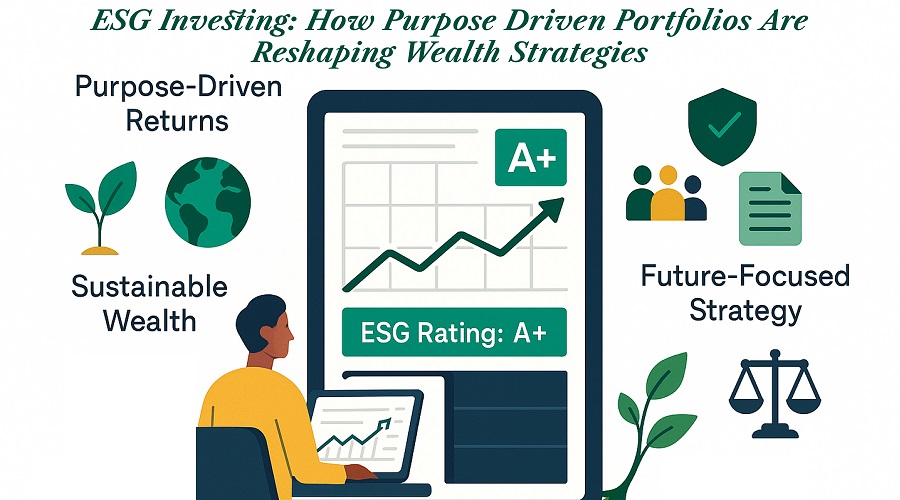In a world where financial performance and social impact increasingly intersect, ESG investing has surged from niche strategy to mainstream powerhouse.
Investors are no longer asking if their money can make a difference but how. With a focus on Environmental, Social, and Governance factors, ESG investing offers a fresh, ethical lens for wealth building that aligns with the values of modern investors. Here’s what it means, why it matters, and how you can invest with both conscience and confidence.
What is ESG Investing?
ESG investing refers to a strategy that integrates environmental, social, and governance considerations into investment decisions. It’s not about sacrificing returns for virtue it’s about identifying companies that are well-positioned for long-term success because they prioritize sustainability, ethics, and strong corporate practices.
The ESG criteria typically include:
- Environmental: Climate impact, resource use, emissions, energy efficiency
- Social: Labor standards, diversity and inclusion, human rights, community engagement
- Governance: Board structure, transparency, executive pay, shareholder rights
Rather than focusing purely on financials, ESG investing evaluates how a company behaves and whether that behavior contributes to or detracts from global sustainability.
Why ESG Investing is on the Rise
1. Shifting Investor Values
Today’s investors, particularly millennials and Gen Z, are more likely to align their financial decisions with their personal ethics. A Morningstar study revealed that over 70% of investors want their portfolios to reflect their values and ESG investing makes that possible.
2. ESG Outperformance Trends
Contrary to the myth that ESG investing underperforms, numerous studies have shown that companies with strong ESG profiles often outperform their peers. They tend to manage risk better, build stronger brands, and attract loyal customers and employees all of which fuel long-term growth.
3. Regulatory Momentum
Governments and financial institutions worldwide are embedding ESG disclosures into reporting standards. This regulatory push is increasing transparency and making ESG data more reliable, enabling smarter investment decisions.
How ESG Investing Actually Works
Screening & Selection
There are three main approaches to building an ESG-focused portfolio:
- Negative Screening: Excluding companies involved in harmful activities (e.g., tobacco, weapons, fossil fuels).
- Positive Screening: Actively choosing companies with strong ESG scores or sustainability practices.
- Thematic Investing: Targeting specific ESG themes like clean energy, gender equality, or circular economy.
- ESG investing often involves scoring companies using third-party ratings from agencies like MSCI, Sustainalytics, or Bloomberg. These ratings assess performance on various ESG metrics, enabling investors to compare and evaluate options objectively.
The ESG Advantage for Long Term Investors
Risk Mitigation
Companies that pollute, violate labor laws, or lack board oversight are increasingly vulnerable to legal, reputational, and operational risks. ESG investing helps investors avoid these landmines by focusing on resilient, responsible organizations.
Stronger Corporate Governance
Well-governed companies tend to make better decisions and deliver more consistent returns. By emphasizing leadership transparency and accountability, ESG investing favors firms that are built to last.
Future-Focused Portfolios
As climate change, social justice, and diversity become defining economic forces, portfolios that account for these issues are better positioned for future growth. ESG investing isn’t just ethical it’s strategic.
How to Start Your ESG Investing Journey
Ready to build an impact-driven portfolio? Here are steps to get started:
- Define Your Values: What causes matter most to you? Climate? Gender equality? Worker rights?
- Choose an Investment Vehicle: Consider ESG mutual funds, ETFs, or robo-advisors that specialize in sustainability.
- Evaluate ESG Scores: Review ESG ratings and company reports. Not all ESG funds are created equal do your homework.
- Monitor and Rebalance: ESG is dynamic. As companies evolve and global standards shift, regularly revisit your portfolio to stay aligned.
You don’t need to overhaul your entire portfolio overnight. Even small ESG allocations can reflect your values while maintaining performance.
If you are a researcher working on a topic, connect with us to clear all your doubts. With expert Data Analysis, Thesis Writing, and dedicated Research Assistant support, we help you achieve Academic Excellence.
FAQs About ESG Investing
Q1: Is ESG investing profitable?
A: Yes. ESG investments have often matched or exceeded the performance of traditional investments over time. Sustainable companies tend to be better managed and less exposed to long-term risks.
Q2: What are some examples of ESG investments?
A: ESG ETFs like iShares MSCI KLD 400 Social ETF or funds like Vanguard FTSE Social Index Fund are common. You can also invest directly in companies with strong ESG ratings like Tesla (environment), Salesforce (social), or Unilever (governance).
Q3: How do I know if a fund is truly ESG?
A: Look at the fund’s holdings, ESG scores, and whether it aligns with your values. Read the prospectus carefully and check if it uses third-party ESG screening.
Q4: Can ESG investing help fight climate change?
A: Absolutely. By divesting from polluters and investing in clean energy or sustainable technologies, ESG investing channels capital toward climate solutions.
Q5: Is ESG investing only for wealthy investors?
A: Not at all. Many platforms now offer ESG options with low minimums. Robo-advisors like Betterment or Wealthsimple provide accessible ESG portfolios for new investors.





Comments